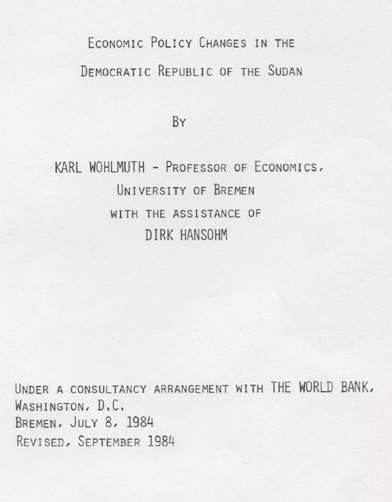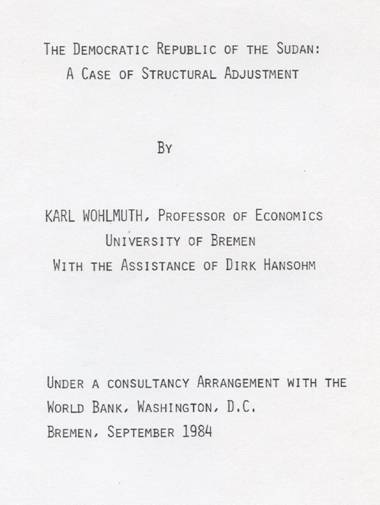Economic Policies in Sudan after the Referendum of 2011
Interested scholars doing research work on Sudan's economy are invited to submit research papers, commented documents and policy-oriented papers on the economic development perspectives of the two new states in Sudan after the Independence Declaration on July 9, 2011.Sixteen policy areas being of interest for such an exercise were identified (see below). So far the discussion on the Sudan separation issues is limited to political, social, ethnic, and legal considerations. These papers will be reviewed and then published in the New Series of the Sudan Economy Research Group (SERG) Discussion Papers at the University of Bremen. These studies are part of a new research project "Economic Policies in Sudan after the Referendum of 2011".
The purpose of the new research project is to investigate into the new policies that are requested in Sudan after the Independence Declaration of the South Sudan. The economic issues of the separation agenda and of the reconstruction and development agenda in the North and in the South are of interest, but most important is it also to look at the cooperation requirements and opportunities between the North and the South after the Independence Declaration. All papers should therefore look carefully at these issues and at the cooperation agenda as both states will lose in terms of economic development if cooperation and coordination activities are not forthcoming.
In a first step the research papers and the policy-oriented papers will be discussed and published in the new edition of the SERG Discussion Paper Series. Invited are papers according to the list of sixteen areas that were identified as core issues being of particular interest for Sudan's future (see below). In the second step a discussion process will be started on the policy implications of the papers to discuss the issues of the papers according to the main policy areas. The networks of the contributors will be used for this deep exchange of ideas. In the third step a dialogue with economic ministries, civil society institutions, and experts in the North and in the South of the Sudan will be started on these issues to compare and to contrast the insights from the papers with current government policy prescriptions and alternative views and plans on policy formation in Sudan. Applications for financial support were already started to finance the publication activity, the network establishment, and later on the dialogue forums in Khartoum and Juba.
Sixteen policy areas being of interest for such an exercise were identified. Apart from the separation agenda the reconstruction and development agenda is demanding as both the North and the South have to develop growth and development visions, and then on this basis new economic strategies and policies, but also action plans and implementation modalities that are broad-based, comprehensive, socially inclusive and which will reach also the remote regions in the two new states. The North and the South have also to learn from past policy failures, so that the policy failures of the past should be reflected in the papers. The list of issues on such an agenda for future-oriented policies in Sudan is long:
1. Development Strategy and Plan Context
2. Macroeconomic Policy Framework
3. Governance Structure and Administrative Reforms
4. Industrial Sector Development and Policy Reforms
5. Agricultural Sector Development and Policy Reforms
6. Agro-industrial and Agribusiness Development Strategies
7. Oil Sector and Natural Resources Development
8. Public and Private Services Sector Development
9. Labour Market and Migration Policy Reforms
10.Human Development Policies: Education and Health
11.Human Development Policies: Poverty Alleviation and MDGs
12.Infrastructure, ICT and STI Development Strategies
13.Development of Regions and of Urban Areas
14.Foreign Trade and Foreign Investment Policies
15.Regional Economic Integration of Sudan
16.Global Economic Integration of Sudan
In all these policy areas there is demand to base new approaches on visions, strategies and policies, and then to translate all this into action and implementation plans. Most important, for all these policy issues the cooperation agenda for the North and the South should be highlighted, as both new states in Sudan will lose if cooperation is not forthcoming.
Contact:
Professor Dr. Karl Wohlmuth
University of Bremen, Bremen, Germany
Email: wohlmuth@uni-bremen.de
Website: http://www.iwim.uni-bremen.de/
Link zur aktuellen Publikationsliste:
Link zu den SERG Discussion Papers:
http://www.iwim.uni-bremen.de/publikationen/pub-sudan.htm
Major Essays on Productive Sector Development in Sudan by Professor Karl Wohlmuth
Wohlmuth, Karl, 1989, Sudan's Industrialisation after Independence:
A Case of Africa's Crisis of Industrialisation, pp. 357 - 379, in: Nurul
Islam (Ed.), The Balance between Industry and Agriculture in
Economic Development, Volume 5, Factors Influencing Change,
Houndmills et al.: The Macmillan Press LTD in association with the
International Economic Association 1989
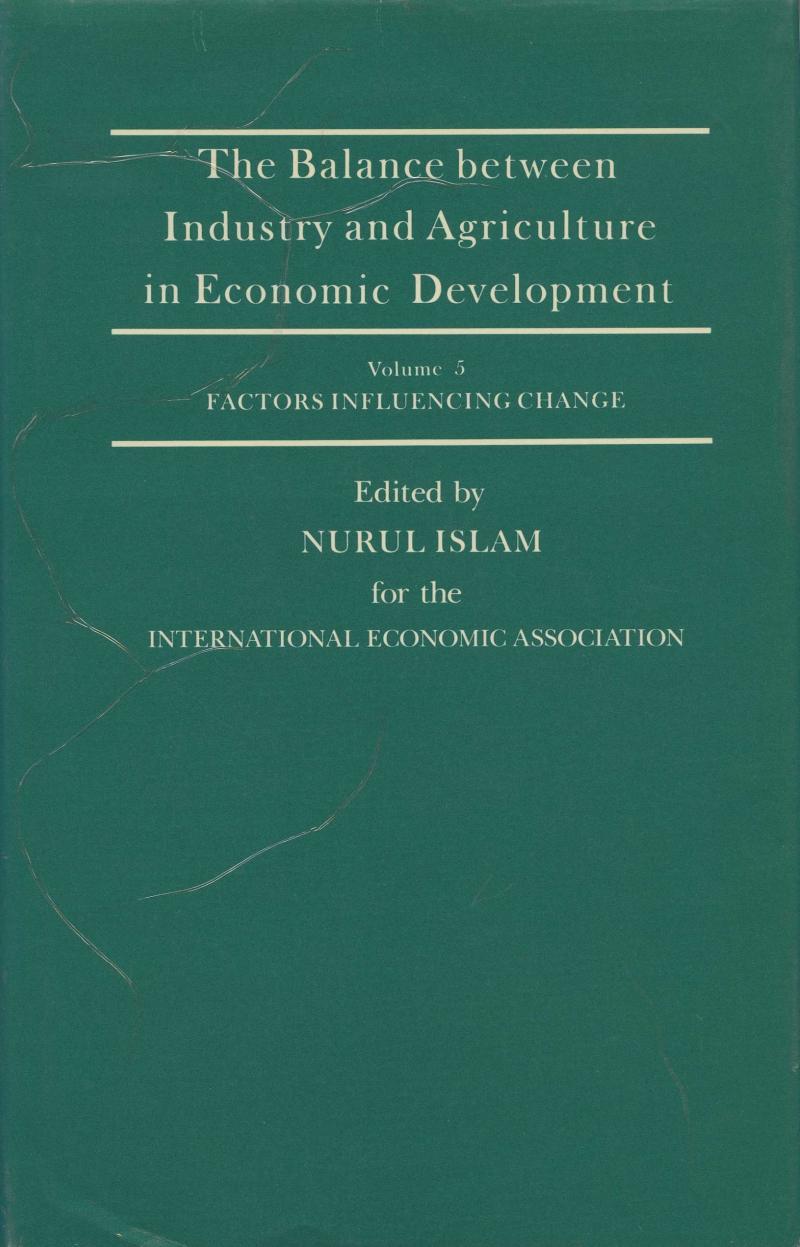
Wohlmuth, Karl, 1991, National Policies for Agriculture, pp. 436 -
454, in: G. M. Craig (Ed.), The Agriculture of the Sudan, Oxford et al.:
Oxford University Press 1991

Wohlmuth, Karl, 1994, Alternative Economic Strategies for the
Sudan, pp. 204 - 247, in: Sharif Harir/Terje Tvedt (Ed.), Short-Cut To
Decay, The Case of the Sudan, Uppsala: Nordiska Afrikainstitutet
1994

Wohlmuth, Karl/Peter Oesterdiekhoff, Eds., 1983, The Development Perspectives of the Democratic Republic of Sudan, The Limits of the Breadbasket Strategy, IFO-Institut Für Wirtschaftsforschung München, Abteilung Entwicklungsländer, Afrika-Studien 109, München/Köln/London: Weltforum Verlag
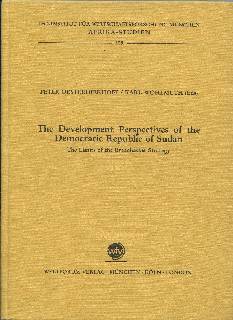
Wohlmuth, Karl/Rainer Tetzlaff, Hrsg., 1980, Der Sudan, Probleme und Perspektiven der Entwicklung, Darstellungen zur internationalen Politik und Entwicklungspolitik 4, Institut für Internationale Angelegenheiten der Universität Hamburg, Frankfurt am Main: Alfred Metzner Verlag GmbH
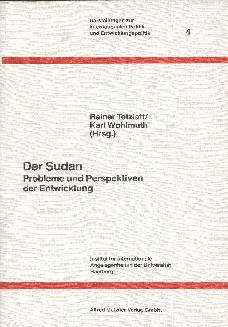
Wohlmuth, Karl /Wauschkuhn, Markus (Hrsg.), 1995, "Die Sudanforschung in der Bundesrepublik Deutschland", Schriftenreihe des Instituts für Weltwirtschaft und Internationales Management, Bd. 2, Lit-Verlag, Münster und Hamburg 1995
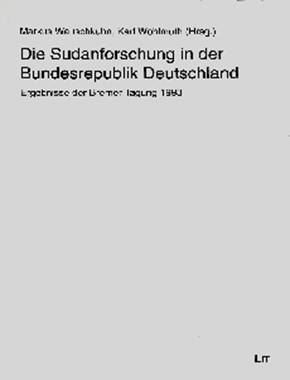
ILO (International Labour Office), 1987, Employment and economic reform: Towards a strategy for the Sudan, Report to the Prime Minister of a mission financed by the United Nations Development Programme and organised by the International Labour Office/Jobs and Skills Programme for Africa, August-September 1986, Geneva: International Labour Office, 172 pages
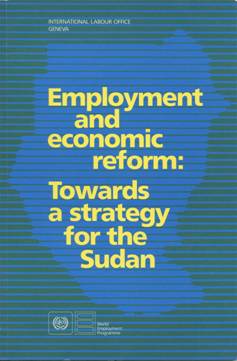
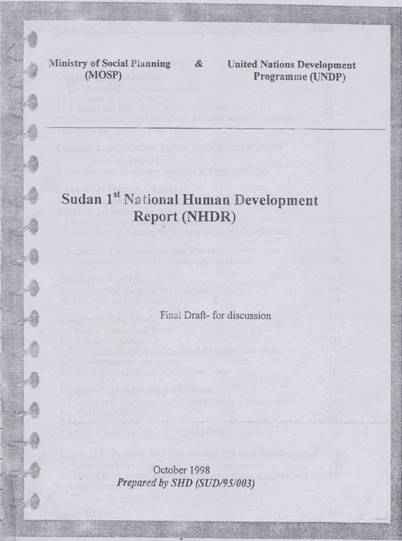
Source: MOSP/Ministry of Social Planning, Khartoum, Sudan/UNDP/United Nations Development Programme, Khartoum, Sudan, 1998, Sudan 1st National Human Development Report (NHDR), Final Draft, October 1998, Prepared under SHD (SUD/95/003), 249 pages



